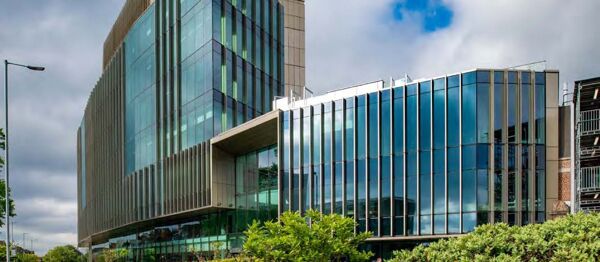
The work involved building a 39 m long curved footbridge over the busy Hip Wo Street near the junction with Mut Wah Street in Kwun Tong. The 4−6 m wide fair-faced reinforced concrete deck has two curved arms of 6 m and 13 m length, making an X-shape in plan. The northern ends of the structure are accessed by a new 20-person lift and staircase, while the southern ends connect to a health centre, a residential and retail complex, and an existing footbridge. The project also included diversion of a water main, installation of piled foundations, landscaping and all related electrical and mechanical works.
NEC project manager was the South Development Office of CEDD, and the designer and NEC supervisor was Meinhardt Infrastructure and Environment Limited. Despite the congested site and Covid-19 restrictions, the bridge opened in November 2021, six months ahead of the original completion date, below the tendered cost and with zero accidents.
It was highly commended for the NEC Transport Project of the Year Award in 2021.
Collaborative working
Andrew Huang, the engineer of the South Development Office, says the project team worked collaboratively from the outset in line with the NEC requirement of acting in a, ‘spirit of mutual trust and co-operation’. ‘An amicable and trustworthy relationship was developed to overcome the challenges encountered, maintain an excellent safety record and ensure a partnering relationship with all external stakeholders.’
He says a good example of collaboration came right at the start of the project, when the alignment of the existing water main to be diverted to make room for a footbridge foundation was found to be underneath the footpath and near a shopfront, significantly different to the record drawings and in conflict with the proposed foundation. ‘This meant the originally planned diversion of the water main was going to cause significantly more impact on nearby shops and pedestrians. Following an NEC early warning and risk reduction meetings, further site investigations and formulation of an alternative foundation design were completed in just 4 weeks. This reduced the extent of conflict with the water main and, as a result, the overall utility diversion works were shortened from 12 to 9 months.’
Huang says the NEC-inspired collaboration extended to the wider community to ensure the project outcomes would meet their needs. ‘For example, during construction the capacity of the lift was upgraded from 12 to 20 persons to meet growing local demand. Additional drainage pumping facilities were also provided to protect the lift shaft from flooding, and additional cladding was installed to protect lighting installations against vandalism. All these changes were accomplished swiftly and amicably, a testament to the proactive and cooperative attitudes of the project team.’
He says the project team also partnered with the Urban Renewal Authority, which was building the adjacent residential and retail complex, a new Public Transport Interchange and connecting footbridge. ‘We conducted regular liaison meetings to establish a coordinated temporary traffic management scheme, utilities diversion plans and tree preservation proposals to facilitate a seamless interface between our respective works.’
Managing change and risk
Huang says the project was directly impacted by Covid-19. ‘Delays in overseas shipments of construction materials, social distancing measures and extra resources for site hygiene affected all members of the project team and supply chain. Through early warnings, collaborative re-sequencing of the works, engaging dedicated additional workers to deal with site hygiene under NEC project manager instructions, and sourcing alternative suppliers for advance shipment of materials, the impact of the pandemic was significantly reduced.’
He says the NEC early warning process kept the project team fully aware of potential risks throughout the works. ‘With a comprehensive risk register and open-minded discussions at risk reduction meetings, the project team managed to identify and resolve all critical issues early.’
Benefits Of Using NEC
- NEC requirement to act in a ‘spirit and mutual trust and co-operation’ resulted in a collaborative relationship between the project team as well as with external stakeholders.
- NEC early warnings and risk reduction meetings enabled the project team to identify and mitigate all potential project risks.
- NEC collaborative processes helped ensure that, despite challenges such as Covid-19 and inaccurate utility records, the project was completed six months early, under budget and with zero accidents.



